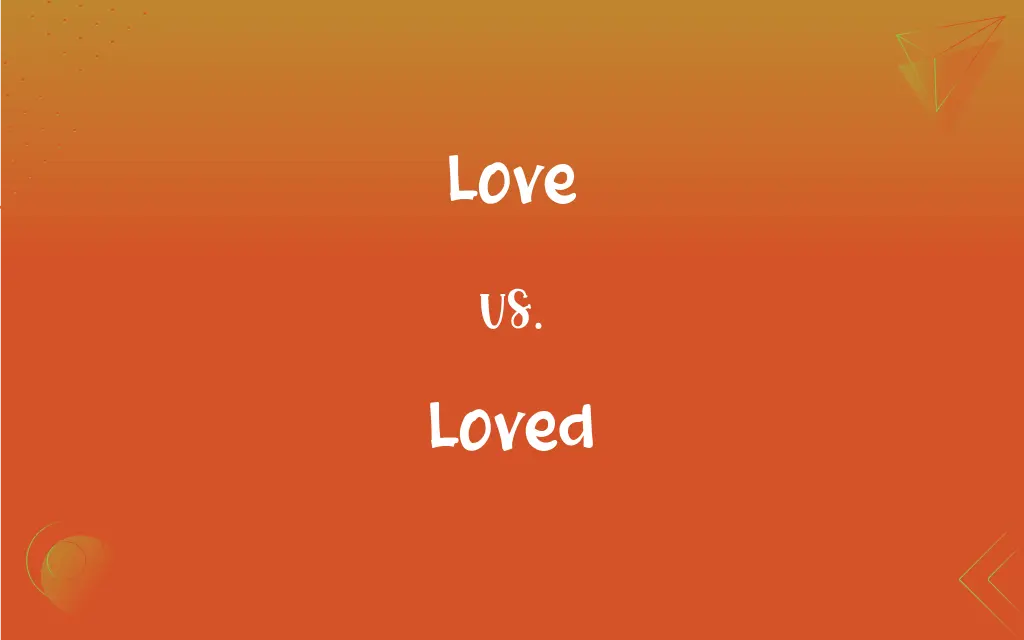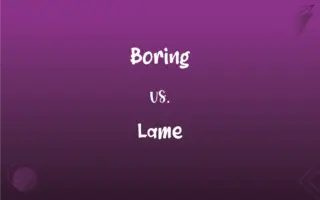Love vs. Loved: What's the Difference?
Edited by Harlon Moss || By Janet White || Updated on September 26, 2023
"Love" is a noun or verb referring to a deep affection, while "Loved" is the past tense and past participle of "Love," denoting a completed action or state.

Key Differences
"Love" and "Loved" are integral to human experience, representing powerful emotional states or actions. "Love," used as a noun, refers to an intense feeling of deep affection or care towards someone or something. As a verb, "Love" describes the action of showing this deep affection or care. It’s a present tense verb, denoting an ongoing, current action or state, suggesting that the feeling or action of love is happening in the present.
"Loved," on the other hand, is the past tense and past participle form of the verb "Love." It signifies that the action or the feeling of love has occurred in the past. "Loved" denotes a completed action or a state that existed previously. It conveys the existence of love in the past, either at a specific point in time or over a period, and it can also imply a continued state or condition of being loved.
The use of "Love" reflects active, present engagement, a current state or action of loving. It’s dynamic and present, emphasizing the ongoing nature of the emotion or the action. It’s applicable in various contexts, expressing romantic affection, familial bond, or general liking, reflecting the multifaceted nature of love, which can be both a state of being and an action.
"Loved," meanwhile, conveys a sense of nostalgia or reflection. It can evoke a feeling of loss or remembrance, highlighting the transient nature of experiences and emotions. It might be used to remember loving moments or relationships that were characterized by love in the past, emphasizing a sense of time and transition inherent to human experiences and relationships.
While "Love" is broad, encompassing a range of emotions, relationships, and actions, "Loved" is more specific, narrowed by the constraints of time and reflection. "Love" is active and present, a current state or action, while "Loved" is reflective and past, a completed action or a bygone state.
ADVERTISEMENT
Comparison Chart
Grammar
Can be a noun or a verb in present tense.
Is a verb in past tense or a past participle.
Denotation
Refers to a feeling or action of deep affection.
Denotes a completed action or state of having been loved.
Usage
Used to express current emotion or action.
Used to express past emotion or reflect on past experiences.
Context
Active, ongoing, and present.
Reflective, bygone, and completed.
Application
Applicable in expressing ongoing affection or likeness.
Applicable in narrating or remembering past events.
ADVERTISEMENT
Love and Loved Definitions
Love
A strong feeling of affection and concern toward another person, as that arising from kinship or close friendship.
Loved
Felt deep affection for (someone) in the past.
She loved him despite his flaws.
Love
A deep, intense feeling of affection and care.
His love for her was evident in his caring actions.
Loved
Liked or enjoyed very much in the past.
She loved traveling around the world.
Love
A benevolent, compassionate concern for the well-being of others.
The charitable organization showed love to the needy by providing food and shelter.
Loved
Took great pleasure in a particular thing or activity in the past.
He loved fishing on calm mornings.
Love
A strong feeling of affection and concern for another person accompanied by sexual attraction.
Loved
Held a deep, tender feeling in the past.
He loved his dog, who was his constant companion.
Love
A feeling of devotion or adoration toward God or a god.
Loved
A strong feeling of affection and concern toward another person, as that arising from kinship or close friendship.
Love
A feeling of kindness or concern by God or a god toward humans.
Loved
A strong feeling of affection and concern for another person accompanied by sexual attraction.
Love
Often Love(Christianity) Charity.
Loved
A feeling of devotion or adoration toward God or a god.
Love
Sexual desire or activity
The pleasures of love.
A night of love.
Loved
A feeling of kindness or concern by God or a god toward humans.
Love
An instance of being in love
Teenage loves can be as fleeting as they are intense.
Loved
Often Love(Christianity) Charity.
Love
A person for whom one has strong feelings of affection
She met her new love at the restaurant.
Loved
Sexual desire or activity
The pleasures of love.
A night of love.
Love
Used as a term of endearment for such a person.
Loved
An instance of being in love
Teenage loves can be as fleeting as they are intense.
Love
An intense emotional attachment to something, as to a pet or treasured object.
Loved
A person for whom one has strong feelings of affection
She met her new love at the restaurant.
Love
An expression of one's affection
Send him my love.
Loved
Used as a term of endearment for such a person.
Love
A strong predilection or enthusiasm
A love of language.
Love for the game of golf.
Loved
An intense emotional attachment to something, as to a pet or treasured object.
Love
The object of such an enthusiasm
The outdoors is her greatest love.
Loved
An expression of one's affection
Send him my love.
Love
Love(Mythology) Eros or Cupid.
Loved
A strong predilection or enthusiasm
A love of language.
Love for the game of golf.
Love
(Sports) A score of zero, as in tennis.
Loved
The object of such an enthusiasm
The outdoors is her greatest love.
Love
To feel love for (a person)
We love our parents. I love my friends.
Loved
Love(Mythology) Eros or Cupid.
Love
To feel sexual love for (a person).
Loved
(Sports) A score of zero, as in tennis.
Love
To feel devotion to (God or a god).
Loved
To feel love for (a person)
We love our parents. I love my friends.
Love
To feel or show kindness or concern to (a person). Used of God or a god.
Loved
To feel sexual love for (a person).
Love
To have an intense emotional attachment to
Loves his house.
Loved
To feel devotion to (God or a god).
Love
To embrace or caress
They were loving each other on the sofa.
Loved
To feel or show kindness or concern to (a person). Used of God or a god.
Love
To have sexual intercourse with.
Loved
To have an intense emotional attachment to
Loves his house.
Love
To like or desire enthusiastically
Loves swimming.
Loved
To embrace or caress
They were loving each other on the sofa.
Love
To thrive on; need
The cactus loves hot, dry air.
Loved
To have sexual intercourse with.
Love
To feel love or sexual love for another.
Loved
To like or desire enthusiastically
Loves swimming.
Love
(uncountable) A deep caring for the existence of another.
Loved
To thrive on; need
The cactus loves hot, dry air.
Love
(uncountable) Strong affection.
Loved
To feel love or sexual love for another.
Love
A profound and caring affection towards someone.
A mother’s love is not easily shaken.
My husband’s love is the most important thing in my life.
Loved
Simple past tense and past participle of love
Love
Affectionate, benevolent concern or care for other people or beings, and for their well-being.
Loved
Being the object of love.
Love
A feeling of intense attraction towards someone.
I have never been in love as much as I have with you.
Loved
Held dear;
His loved companion of many years
Love
A deep or abiding liking for something; an enthusiasm for something.
My love of cricket knows no bounds.
Loved
Experienced a strong, passionate attraction in the past.
They loved each other deeply, creating numerous cherished memories.
Love
(countable) A person who is the object of romantic feelings; a darling, a sweetheart, a beloved.
Love
A term of friendly address, regardless of feelings.
Hello love, how can I help you?
Love
A thing, activity, etc. which is the object of one's deep liking or enthusiasm.
Love
(euphemistic) Sexual desire; attachment based on sexual attraction.
Love
(euphemistic) Sexual activity.
Love
An instance or episode of being in love; a love affair.
Love
Used as the closing, before the signature, of a letter, especially between good friends or family members, or by the young.
Love
(obsolete) A thin silk material.
Love
A climbing plant, Clematis vitalba.
Love
Zero, no score.
So that’s fifteen-love to Kournikova.
Love
Nothing; no recompense.
Love
To have a strong affection for (someone or something).
I love my spouse.
I love you!
I love that song!
Love
(transitive) To need, thrive on.
Mold loves moist, dark places.
Love
(transitive) To be strongly inclined towards something; an emphatic form of like.
I love walking barefoot on wet grass;
I'd love to join the team;
I love what you've done with your hair
Love
To care deeply about, to be dedicated to (someone or something).
Love
(transitive) To derive delight from a fact or situation.
I love the fact that the coffee shop now offers fat-free chai latte.
Love
To have sex with (perhaps from make love).
I wish I could love her all night long.
Love
A feeling of strong attachment induced by that which delights or commands admiration; preëminent kindness or devotion to another; affection; tenderness; as, the love of brothers and sisters.
Of all the dearest bonds we proveThou countest sons' and mothers' loveMost sacred, most Thine own.
Love
Especially, devoted attachment to, or tender or passionate affection for, one of the opposite sex.
He on his sideLeaning half-raised, with looks of cordial loveHung over her enamored.
Love
Courtship; - chiefly in the phrase to make love, i. e., to court, to woo, to solicit union in marriage.
Demetrius . . . Made love to Nedar's daughter, Helena,And won her soul.
Love
Affection; kind feeling; friendship; strong liking or desire; fondness; good will; - opposed to hate; often with of and an object.
Love, and health to all.
Smit with the love of sacred song.
The love of science faintly warmed his breast.
Love
Due gratitude and reverence to God.
Keep yourselves in the love of God.
Love
The object of affection; - often employed in endearing address; as, he held his love in his arms; his greatest love was reading.
Open the temple gates unto my love.
Love
Cupid, the god of love; sometimes, Venus.
Such was his form as painters, when they showTheir utmost art, on naked Lores bestow.
Therefore do nimble-pinioned doves draw Love.
Love
A thin silk stuff.
Love
A climbing species of Clematis (Clematis Vitalba).
Love
Nothing; no points scored on one side; - used in counting score at tennis, etc.
He won the match by three sets to love.
Love
Sexual intercourse; - a euphemism.
A little western flower,Before milk-white, now purple with love's wound;And maidens call it love-in-idleness.
Love
To have a feeling of love for; to regard with affection or good will; as, to love one's children and friends; to love one's country; to love one's God.
Thou shalt love the Lord thy God with all thy heart, and with all thy soul, and with all thy mind.
Thou shalt love thy neighbor as thy self.
Love
To regard with passionate and devoted affection, as that of one sex for the other.
Love
To take delight or pleasure in; to have a strong liking or desire for, or interest in; to be pleased with; to like; as, to love books; to love adventures.
Wit, eloquence, and poetry.Arts which I loved.
Love
To have the feeling of love; to be in love.
Love
A strong positive emotion of regard and affection;
His love for his work
Children need a lot of love
Love
Any object of warm affection or devotion;
The theater was her first love
He has a passion for cock fighting
Love
A beloved person; used as terms of endearment
Love
A deep feeling of sexual desire and attraction;
Their love left them indifferent to their surroundings
She was his first love
Love
A score of zero in tennis or squash;
It was 40 love
Love
Sexual activities (often including sexual intercourse) between two people;
His lovemaking disgusted her
He hadn't had any love in months
He has a very complicated love life
Love
Have a great affection or liking for;
I love French food
She loves her boss and works hard for him
Love
Get pleasure from;
I love cooking
Love
Be enamored or in love with;
She loves her husband deeply
Love
Have sexual intercourse with;
This student sleeps with everyone in her dorm
Adam knew Eve
Were you ever intimate with this man?
Love
A profound, passionate attraction.
They found love the moment they met each other.
Love
A term of endearment expressing affection.
“Love, can you please pass the salt?” she asked her husband.
Love
An intense interest or pleasure in something.
Her love for painting started at a young age.
FAQs
Is Love always positive?
While typically positive, Love can sometimes have negative consequences or be perceived negatively, depending on the context.
Can Loved be used as a noun?
No, Loved is a verb or an adjective and is not used as a noun.
Is Love only a romantic feeling?
No, Love can represent a range of affections, including familial, platonic, or general liking.
Can Loved be used to describe non-human entities?
Absolutely, Loved can refer to past affection for animals, objects, activities, etc.
Can Loved refer to a continued state?
Yes, Loved can reflect a state that began in the past and continues in the present.
Is Love only a human emotion?
While Love is a complex human emotion, animals also exhibit behaviors indicative of affection and attachment.
Does Loved always imply a loss?
No, Loved can reflect on past affection without necessarily implying loss or absence.
Is Love an action or a feeling?
Love can be both an action, expressed through deeds, and a feeling, experienced emotionally.
Can being Loved change a person?
Being Loved can profoundly impact a person’s well-being, outlook, and behavior, contributing to personal growth and fulfillment.
Can Love be quantified?
Love is a subjective emotion and is not typically quantifiable in a concrete manner.
Can one feel Loved without being explicitly told so?
Yes, feeling Loved can often come from actions, behaviors, or a general sense of being valued and cared for.
Can Love be unconditional?
Unconditional Love refers to affection without limitations or conditions, often idealized as pure and selfless.
Is it possible to Love without liking?
While seemingly paradoxical, it is possible to Love someone deeply but struggle with liking them at times, especially in complex relationships.
Can Love be temporary?
While Love is often viewed as enduring, it can be fleeting and change over time due to various circumstances.
Can Loved refer to the present state?
Loved typically denotes a past state, but it can imply that the state of being loved continues to the present.
About Author
Written by
Janet WhiteJanet White has been an esteemed writer and blogger for Difference Wiki. Holding a Master's degree in Science and Medical Journalism from the prestigious Boston University, she has consistently demonstrated her expertise and passion for her field. When she's not immersed in her work, Janet relishes her time exercising, delving into a good book, and cherishing moments with friends and family.
Edited by
Harlon MossHarlon is a seasoned quality moderator and accomplished content writer for Difference Wiki. An alumnus of the prestigious University of California, he earned his degree in Computer Science. Leveraging his academic background, Harlon brings a meticulous and informed perspective to his work, ensuring content accuracy and excellence.































































